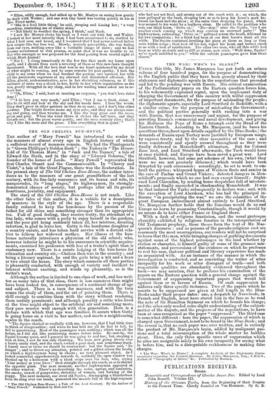THE OLD CHELSEA liDN-31017SE.•
THE author of "Mary Powell" has introduced the reader to the manners of almost every age in English history of which a sufficient record of manners remain. We had the Plantagenets in "Queen Phillippa's Golden Book " ; the Tudors in "The Household of Sir Thomas More," in "Jack and the Tanner," a tale of Edward the Sixth, and in the story of "Edward Osborne," the founder of the house of Leeds. "Mary Powell" represented the first Charles Stuart and the Commonwealth. In "Cherry and Violet," a tale of the Great Plague, there was the Restoration. In the present story of The Old Chelsea Bun-House, the author introduces us to the manners of our great grandfathers of the last century, with its fine-lady coarseness and its beaux and wits, its masquerades, its "long stages," its highwaymen, its stronglydemarcated classes of society, but perhaps after all its greater heartiness, joviality, and enjoyment
The story of the Old Chelsea Bun-House is not much. Like the other tales of this author, it is a vehicle for a description of manners in the style of the age. There is a respectable family reduced to keep the bun-house by the passion of the father for old china and something stronger than its appropriate tea. Full of good feeling, they receive Getty, the attendant of a fine lady, who comes with a party to enjoy herself in the gardens, and the poor girl being suddenly taken ill, her mistress, dreading infection, is glad to leave her. Gatty is the handsome daughter of a country curate, and has taken hard service with a distant relative to relieve her widowed mother. Her illness at the bunhouse naturally introduces a physician of the old school; who, however inferior he might be to his successors in scientific acquirements, exercised his profession with less of a trader's spirit than is customary now. There is a curate lodging at the bun-house for relaxation and country air,—Chelsea then was in the country ; and being a literary aspirant, he and the girls bring a wit and a beau or two about the house. The story which connects all these parties is pleasantly conducted, with enough of variety and incident to interest without exciting, and winds up pleasantly, as is the writer's wont.
Although the author is limited to one class of work, and has written so many tales of that class, there is less sameness than might have been looked fpr, in consequence of a continual change of age and subject. There is a turn for manners, and with the turn comes the study of them, and the art of painting them. There is skill enough to combine them with the story without rendering them unduly prominent; and although possibly a critic who lived at the time might object to the artificial air and something more, they pass muster well enough with this generation. Here is a picture with which that age was familiar. It occurs when Gatty is going home on a visit to her mother, and meets a neighbouring squire in the coach.
"The Squire chatted so cordially with me, however, that I had little time to think of disagreeables; and when he had told me all he had to tell, he fell to questioning. Most of the passengers were nodding ; which was all the better, as I did not like mentioning names before folks. By-and-by, the Squire became quiet, and I guessed he was going to nod too; but, stealing a look at him, I saw he was only thinking. We were now going slowly over
a heavy sandy road, and the coach rocked a good deal, and sometimes stuck. I feared once or twice we should be overturned : but the Squire said, No
danger' ; and to divert my attention, pointed out a gibbet across the heath, on which a highwayman hung in chains ; no very pleasant object. As I looked somewhat apprehensively towards it, suddenly the open window was
blocked up by a horseman with a black crape over his face, who, crying
Your money or your lives !' fired straight through the coach, so as to shatter the opposite glass. The next moment, another highwayman appeared at
the other window. There's no describing the noise, uproar, and confusion, the smoke, stench of gunpowder, shrieking of women, and barking of the Puppy. The next moment, our stout old Squire, disengaging a blunderbuss from its sling over our heads, presented the muzzle full at the highwayman
* The Old Chelsea Bun-House ; a Tale of the Last Century. By the Author of "Mary Powell." Published by Ball and Co. who had not yet fired, and sprang out of the coach with it ; on which, the man galloped up the bank, stooping low, so as to keep his horse's neck between his head and the piece ; at the seine time dropping his pistol, which was secured to his waist by a leathern strap. He called to the postilion who rode our third horse, Drive on !"No—stop!' cries the Squire, 'for I see another coach coming up, which may contain an unarmed. partY ! ' The highwaymen, reiterating, Drive on ! galloped across the heath, followed by his two companions ; for a third had been at our first horse's head all the while. The Squire continued levelling his piece at them as long as they were within range ; then took off his hat, wiped his head, and turned about to us with a look of satisfaction. The other two men who all this while hub been as white as death and as still as stones, now cried, 'Well done, Squire! we're much indebted to you!' while the outside passengers gave him three cheers."
























 Previous page
Previous page